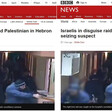Media Watch 12 April 2014

Israel’s slaying of university student Saji Darwish was not deemed newsworthy by the BBC.
APA imagesOver the last five weeks, the trend in BBC reporting to ignore events that show Israel in a negative light, while affording coverage to tenuous claims from the Israeli army that it has uncovered Palestinian “terror” plots, has become quite glaring.
On 19 March, a 14-year-old Palestinian child, Yussef Shawamreh, was shot in the back and hip by Israeli soldiers as he foraged for edible wild thistles on his family’s land in the occupied West Bank.
The child bled to death. His two friends, aged 12 and 17, were seized by soldiers dressed in black fatigues and wearing black face masks, and taken to a nearby illegal settlement, in handcuffs and blindfolds. There they were beaten for failing to answer questions in Hebrew, a language neither understands.
By any standards, the cold-blooded killing of a 14-year-old by soldiers, and the subsequent abuse of his young friends, is appalling. The media outcry if the boy had been Israeli and his killers Palestinian can only be guessed at.
As it is, with the dead child being Palestinian, the BBC ignored the story. The previous week, the BBC also failed to report on the killing on 10 March of university student Saji Darwish, also in the West Bank.
Saji, a university student, was shot in the head by Israeli forces as he tended his goats.
Prevailing news agenda
When challenged by Palestine Solidarity Campaign on its failure to report on the killings of young Palestinians by the Israeli army – two in nine days – BBC Online’s Middle East desk wrote back saying: “There is no mandate to report every killing.”
And so killings of Palestinians went by with the BBC’s journalists feeling under no obligation, or mandate, to report any of them.
Pressed further, the Middle East desk wrote back again to say: “The fact that we did not report the death of Yusef Abu Aker Shawamreh [sic] should not be construed as evidence of bias.”
The Middle East desk added: “There can be occasions where an incident does not get mentioned, possibly as a result of the prevailing news agenda.”
So what was the prevailing news agenda around the time of these youths’ deaths?
According to BBC Online, it would appear to be an overwhelming concern with Israel’s security, and the threat the state claims it faces from Palestinians.
On 5 March, BBC Online ran with the story “Israel ‘halts weapons shipment from Iran.’”
The article begins: “Israel says it has seized a ship carrying advanced Iranian weapons made in Syria that was heading towards Gaza.”
The alleged weapons were surface-to-surface missiles.
The story continues: “Israeli Prime Minister Benjamin Netanyahu said the shipment was a ‘clandestine operation’ by Iran, and added that the weapons would have been used against Israel.”
Credulous BBC news team
The BBC’s source for the story is, in its own words, “the Israel Defense Forces.” There is a link from the BBC’s page to the story on the Israeli army’s website.
The story is based entirely on the claims of the Israeli prime minister and Israeli army officials, and doesn’t even begin to question how surface-to-surface missiles could possibly be smuggled into besieged Gaza.
Nor is the timing of the Israelis’ find questioned by the credulous BBC news team. The announcement came just days before EU foreign policy chief Catherine Ashton’s relationship-building visit to Iran (which denied any involvement in the shipment).
Instead, the Middle East desk chose to run a corresponding feature headlined “Israel’s clandestine battle with weapons smugglers.”
An incredibly lengthy report, written by the BBC’s diplomatic correspondent Jonathan Marcus, it claims to reveal how the “major shipment of weaponry heading to the Gaza Strip from Iran throws a spotlight on alleged ongoing attempts to arm militants there, and Israel’s aim to thwart them.”
The feature continues in predictable BBC form, with subheadings such as: “So how does this compare to previous Gaza arms interceptions?”
All Israeli allegations of where the arms were headed and what they were to be used for are taken as fact. There is no critical analysis at all of Israel’s sudden announcement.
“Israel has lied”
However, while the BBC remained oblivious to the absurdities of claims that a missile-loaded ship might be headed to Gaza, under land, sea and air blockade, and to the possibility that it was acting as a pliable conduit for Israeli propaganda, more sceptical news organizations challenged Israel’s allegations.
The Israeli newspaper Haaretz ran a story headlined: “Netanyahu’s display of seized ship: meaningless Hollywood-style propaganda.”
Columnist Amir Oren writes: “From David Ben-Gurion’s time to the present, Israel has lied when it believed it had to.”
In its report “Doubts surface on Gaza destination of rockets seized by Israel,” the respected news agency Reuters quotes an unnamed US official as saying: “You look at those things and it’s obvious they couldn’t have been slipped into Gaza.”
Even the right-wing Times of Israel chose to cover the story from all angles, and not just from Israel’s perspective, as the BBC had done. Its report is headlined: “Iran arms ship may have been bound for Sinai, not Gaza.”
Correspondent Marissa Newman refers to investigations by US and Middle East intelligence analysts which concludes that: “Israel may have obfuscated [the ship’s] real destination in order to spare Egypt the humiliation of conceding the security unrest in the peninsula.”
Fact or speculation?
Compare these reports, responsibly analyzing the possibility that this story was no more than Israeli propaganda, with the BBC’s decision to use Israel’s claims as an opportunity to manufacture a feature on how an embattled Israel is fighting a “clandestine battle” with weapons smugglers.
Even when US doubts about the story began to emerge, the BBC refused to report on them, sticking with the Israeli side of the story which paints Palestinians in Gaza as violent militants.
Questioned on why the BBC is so willing to believe and report on all Israel has to say, the online Middle East desk replied: “The veracity of all stories can be called into question if there is not independent verification, but this depends on the reliability of the source and the credibility of the available information.”
And who is the source for this story? Back to the Middle East desk: “The article makes it clear that the announcement has come from Israel, i.e. that is the source.”
In other words, the BBC’s news teams are willing to throw journalistic values to the wind and accept Israel – a country which remains implicitly dishonest about its nuclear arsenal – as a credible and reliable source, in a way it probably wouldn’t do with any other country.
The Middle East desk certainly places what Israel has to say above what US and Middle East analysts have to say. Asked to follow up its original story by reporting on their doubts about the arms shipment, the Middle East desk replied that “to comment further would be purely speculative.”
So, according to the BBC, what US officials have to say is speculation, but what comes out of the mouths of Israeli officials is fact.
Promoting Israel’s viewpoint
On 21 March, BBC Online ran another story that could be viewed as propaganda for Israel under the headline: “Israel ’uncovers longest Gaza tunnel.’”
The BBC’s source once again is the Israeli army, and a link is provided to the story on the army’s website as verification for its authenticity.
The BBC reports: “A spokesman said it was the longest tunnel found to date and was meant for use in attacks on Israeli civilians.”
The story came five months after a similar BBC story headlined “Gaza ‘terror tunnel’ uncovered inside Israel.”
In the intervening five months, BBC Online carried no stories on how tunnels between Gaza and Egypt have served as a lifeline to the Palestinians, held under an illegal blockade for seven years. When the BBC reports on tunnels under Gaza, they are solely “terror tunnels.”
And so, in March, the BBC ignored the killings of Palestinian youths in the West Bank, choosing instead to run dubious stories on arms shipments to Gaza and “terror tunnels,” both of which propagate Israel’s hasbara viewpoint of Palestinians as terrorists hellbent on its destruction.
The truthful image of Palestinians that Israel does not want promoted – that of victims of unprovoked Israeli aggression – is kept from BBC audiences.
This week, BBC Online airbrushed another historical moment from its news pages. This time it was the comments of US Secretary of State John Kerry, blaming Israel for the breakdown of talks with the Palestinian Authority, which the BBC decided to withhold from its licence fee-paying audience.
Incredibly, the BBC begins its article in a way that placed the blame on the Palestinians for the collapse of the talks, a claim made by Israel. Once again, the BBC reported from the viewpoint of Israel. The US perspective that Israel precipitated the breakdown was not reported.
So why is BBC Online’s Middle East desk seemingly so determined to shield Israel from bad publicity by withholding important news stories from its audiences, while, on the other hand, pushing anti-Palestinian stories provided by the Israeli army?
Could it be anything to do with the desk’s editor, Raffi Berg, who took up his post in August 2013, and was exposed by The Electronic Intifada for having sent emails to BBC journalists asking them to promote the Israeli perspective in their reporting?
It is, of course, impossible to say. But what can be said, by just looking at its reporting of Israel and the Palestinians over the last five weeks, is that it is becoming almost impossible to hide the pro-Israeli bias of BBC Online’s Middle East desk. For that, the BBC should surely take collective responsibility.






Comments
Tell BBC the news
Permalink eGuard replied on
Someone in London needs to be told about that "internet" telephone line everybody is talking about.
I can and do check all those newssites. I can read and compare them. Does the BBC really think they are the one and only source? And, to worry about: did they do the same before I called the internet?
journalism
Permalink joy replied on
journalism is not a crime but when a journalist takes side, he becomes a criminal.
BBC bias due to it being stuffed with Israel firsters
Permalink Alec replied on
The BBC, like the Conservative and Labour political parties, are stuffed with people whose first priority is to depict Israel as the victim and never the aggressor.
As Media Lens reported ..."James Harding, (former Times journalist) is now in charge of 3,000-plus BBC News journalists ......Harding has stated that: 'I am pro-Israel' and that in reporting on the Middle East, 'I haven't found it too hard' because 'The Times has been pro-Israel for a long time.' Another new senior BBC appointee, James Purnell, who recently became 'Director of Strategy and Digital', is also avowedly pro-Israel. Purnell actually served as chair of the pro-Israeli parliamentary lobby group Labour Friends of Israel from 2002-2004."
The BBC has become a laughing stock in the eyes of those wanting a balanced picture of the situation in Palestine.
BBC and NY Times
Permalink Barbara Erickson replied on
The BBC fails its audience, and it fails the cause of journalism. Thank you for your vigilance in reporting the BBC bias towards Israel. The New York Times has also ignored the deaths of innocent Palestinians. See how they omitted mention of Yusef Shawamreh at http://wp.me/p3zcQt-51 and a mentally ill Gaza woman at http://wp.me/p3zcQt-4M. Both of these are at TimesWarp.org.